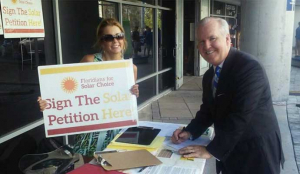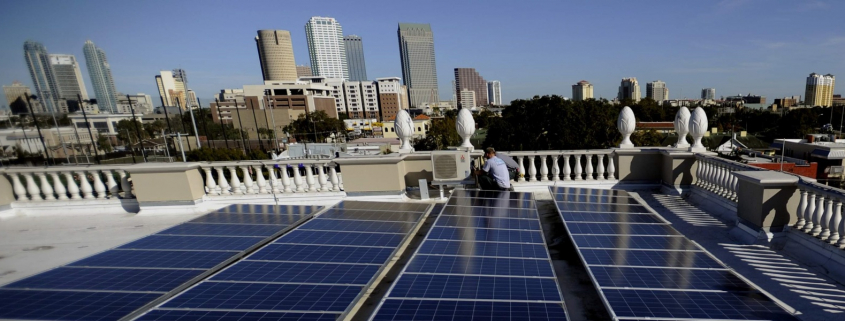Arguing before the Supreme Court Tuesday over whether a solar power constitutional amendment should go forward, supporters of Floridians for Solar Choice and opponents backed by utility companies didn’t pull their punches.
“You can’t make voters believe that there’s a problem when you have no basis for saying that,” Barry Richard, a lawyer representing four utility companies including Duke Energy, Tampa Electric Company and Florida Power and Light, told the justices, trying to convince them that the amendment is misleading.
“Right now, you are a captive customer of your big utility company,” responded Susan Glickman, Florida director of the Southern Alliance for Clean Energy, on the courthouse steps later. “That’s going to change” if the amendment passes.
The constitutional amendment at the center of the debate would allow companies to install solar panels on homes and businesses and sell that energy, without being treated as a utility by state and local regulators. It’s keying up what could become a contentious and very public battle between utility companies and amendment sponsors.
Supporters argue that it will drive down the cost of electricity and open up the market to competition for the monopoly utility companies. But utilities say it merely eliminates regulation meant to keep people safe and will put consumers at risk with limited protections.
The court’s role isn’t to weigh in on the merits of each argument, as Justice Barbara Pariente repeatedly reminded both sides during a public hearing. Rather, the justices have two questions to answer: Does the ballot language fairly show the amendment’s impact? And is it limited to just one subject?
Opponents say it fails both tests by misleading voters and changing the powers of multiple levels of government.
“The voters deserve to understand what this amendment does, and the ballot summary does not make that clear,” Florida Solicitor General Allen Winsor said.
But Bob Nabors, the lawyer for Floridians for Solar Choice, says that’s a hard argument to make. Voters will understand what they’re voting on, he said. The solar choice group also maintains that its language is focused on a single subject.
“There’s a oneness of purpose,” Glickman said. “You do not have to consider every single ramification when there’s a oneness of purpose.”
 If the justices give them a green light, the amendment’s sponsors still need another 562,000 petition signatures to put the amendment language on the ballot in November 2016. Already, both sides are preparing for a hard-fought campaign.
If the justices give them a green light, the amendment’s sponsors still need another 562,000 petition signatures to put the amendment language on the ballot in November 2016. Already, both sides are preparing for a hard-fought campaign.
Opponents have started a committee and constitutional amendment of their own: Consumers for Smart Solar, which aims to protect the existing rules around solar power. The Florida Chamber of Commerce — whose board of directors includes executives from five power companies — is a supporter.
Floridians for Solar Choice has collected $751,176 in contributions, nearly all of it from the Southern Alliance for Clean Energy, a group that refuses to make its donor list public for fears that supporters could be harassed. They said future funding will come from other groups pending the court’s go-ahead.
Source: Miami Herald



